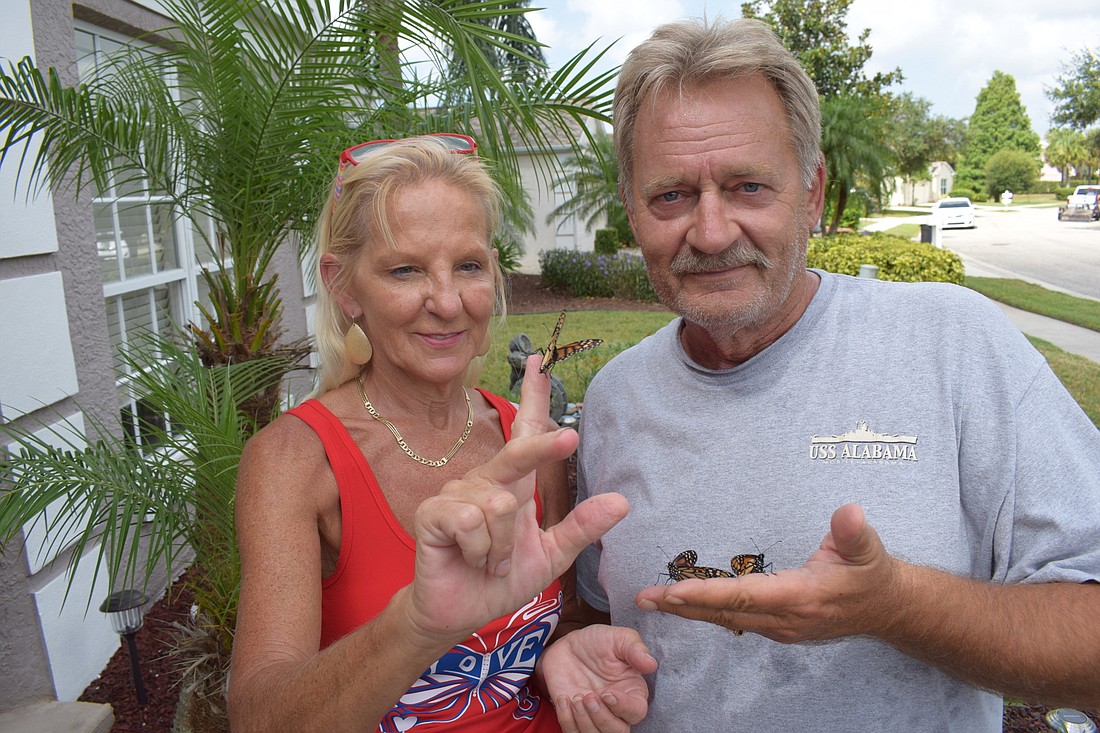- November 30, 2024
-
-
Loading

Loading

When she received "the perfect gift" from a member of Laurel Oaks Country Club in Sarasota, Donna Masters didn't realize it was going to force her to repurpose her garage.
But the waitress, who lives in East County, soon found that life was going to be quite different after she was handed a milkweed plant.
That was four years ago, and Donna and her husband Robert Masters have had to park their cars in the driveway ever since.
Donna Masters brought her gift home and found three caterpillars on it. The woman who presented her with the gift told her she would be great at raising and releasing butterflies.
She began a crash course on raising monarch butterflies and quickly found herself in trouble. She didn't understand how quickly the caterpillars would consume all the leaves on her new plant.
"I didn't even know what milkweed was," she said. "The caterpillars eat eight to 16 leaves a day and I didn't have any food for them. I was frantic. They ate it down in two days."
She imagined having to tell the member that she killed her perfect gift.
That didn't happen, though. She found and bought more milkweed (the only thing monarch caterpillars eat), then learned about how to care for caterpillars until they would emerge as beautiful butterflies.
"I'm like a dog with a bone," Donna Masters said. "When I start something, I'm 150% into it. Our garage turned into an incubator."
She bought mesh-panel habitats to keep the plants and caterpillars safe and began housing them in the garage.
Actually, they did park their cars in the garage on one occasion — during Hurricane Irma. They packed all the mesh cubes in their guest bathroom until the threat was over.
As Donna Masters became adept at nursing the caterpillars through the chrysalis stage until the emerging Monarchs could be released outdoors, the members of the club began calling her "the Butterfly Lady."
She laughs at the thought and noted that it would be more proper to call them the Butterfly Couple.
About six months into her new project, Donna Masters was feeling overwhelmed. Her new hobby was escalating faster than she had expected and she needed help. She came home one day to find her husband caring for the caterpillars in the garage.
"He just started taking care of it," she said with a relieved sigh.
It's easy to see her husband gets as much enjoyment out of his wife's hobby as she does. Donna Masters said her husband can sit and watch them for hours.
"The caterpillars are like little buzzsaws," he said.
They became so successful they once released 762 monarch butterflies on a single day. The time leading up to that day was stressful as those little buzzsaws were consuming plants faster than the Masters could provide them.
"We were both running to different stores," Robert Masters said. "We bought 200 plants and they wiped them clean in a week."
It's a hobby take can get expensive. Robert said they spend between $500 and $1,000 buying plants to feed the caterpillars. Donna laughed and shook her head. "He doesn't understand," she said. "We spend between $2,000 and $3,000."
She said it's worth the money. For one, according to the Save Our Monarchs Foundation, monarch butterfly numbers throughout the U.S. are down 90% since 1992 because the milkweed plant population has been wiped out by development. However, monarch butterflies are not on any protected lists in the U.S.
The butterflies feed on nectar and pollinate wildflowers.
"We are helping the environment," Donna Masters said.
She loves seeing them fly off into her neighborhood and says all the monarchs you see there were raised in her garage. She receives notes of thanks from her neighbors.
Sometimes, when she is walking in the front of her home, the butterflies will land on her, then will follow her into the backyard to land on the milkweed planted outside there.
She is convinced they know it's her ... the woman who raised them.
The Masters both laugh and shake their heads. They know it's a far-fetched notion, but it makes sense to them.
Robert Masters said he simply enjoys the hobby, even though he has to clean caterpillar "poop" out of the cages.
His wife simply is proud of a task well done.
"I remember the words of the woman who gave me 'the perfect gift.' She said, 'I think you will be good at this.'"